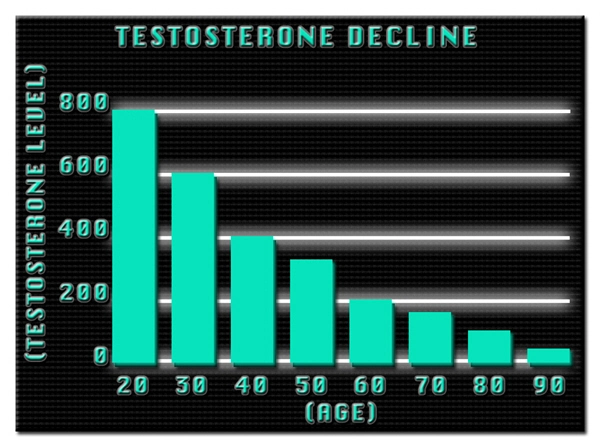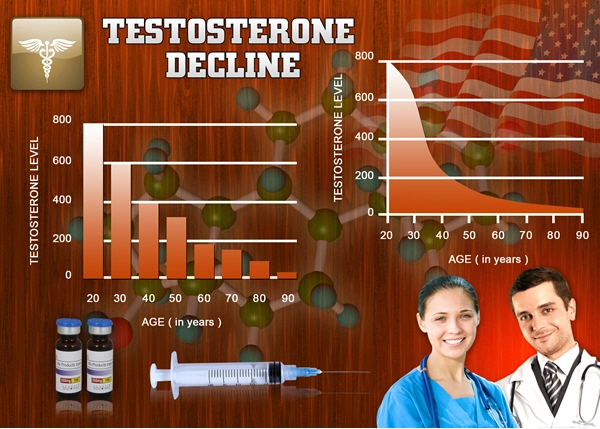Introduction to Testosterone and Its Functions
Testosterone, the primary male sex hormone, plays a pivotal role in various aspects of male health, including sexual function. Produced predominantly in the testes, testosterone influences libido, muscle mass, bone density, and mood. Its impact on sexual performance, particularly in the context of ejaculatory control, has become a focal point of research, especially concerning premature ejaculation (PE) among American males.
Understanding Premature Ejaculation
Premature ejaculation is defined as ejaculation that occurs sooner than desired, either before or shortly after penetration, causing distress or interpersonal difficulty. It is a common sexual dysfunction, affecting approximately 30% of American men at some point in their lives. While psychological factors such as anxiety and stress are often implicated, the role of hormonal imbalances, particularly testosterone levels, is increasingly recognized.
Testosterone's Role in Ejaculatory Control
Research suggests that testosterone levels can influence ejaculatory control. Men with lower testosterone levels may experience difficulties with sexual performance, including PE. Testosterone affects the central nervous system, which regulates the timing of ejaculation. It is believed that optimal testosterone levels can enhance serotonin activity, a neurotransmitter that plays a crucial role in delaying ejaculation.
Hormonal Insights into Premature Ejaculation
Studies have shown a complex relationship between testosterone and PE. For instance, some research indicates that men with PE might have higher levels of free testosterone, which could lead to heightened sexual arousal and reduced ejaculatory latency. Conversely, other studies suggest that low testosterone might contribute to PE by affecting sexual desire and performance. This dichotomy highlights the need for personalized hormonal assessments in managing PE.
The Impact of Age and Lifestyle on Testosterone Levels
Age is a significant factor in testosterone levels, with a natural decline observed as men age. This decline can contribute to sexual dysfunction, including PE. Lifestyle factors such as diet, exercise, and stress also influence testosterone levels. American men, particularly those with sedentary lifestyles or poor dietary habits, may be at a higher risk of hormonal imbalances that could exacerbate PE.
Clinical Approaches to Managing Testosterone and PE
Addressing PE in the context of testosterone levels requires a multifaceted approach. Hormone replacement therapy (HRT) may be considered for men with clinically low testosterone levels. However, HRT is not a universal solution and should be tailored to individual needs. Behavioral therapies, such as the stop-start technique or the squeeze method, can also be effective in improving ejaculatory control.
The Role of Medications
Selective serotonin reuptake inhibitors (SSRIs) are commonly prescribed to treat PE by increasing serotonin levels, which can help delay ejaculation. For men with hormonal imbalances, combining SSRIs with testosterone therapy might offer a more comprehensive approach. However, the use of such medications should be closely monitored by healthcare professionals to manage potential side effects and ensure efficacy.
Future Directions in Research
Ongoing research continues to explore the intricate relationship between testosterone and PE. Future studies may focus on identifying specific biomarkers that can predict the risk of PE based on hormonal profiles. Additionally, personalized medicine approaches could revolutionize the treatment of PE, offering tailored solutions based on individual hormonal and genetic factors.
Conclusion
The role of testosterone in ejaculatory control and premature ejaculation is a critical area of study for improving sexual health among American males. Understanding the hormonal underpinnings of PE can lead to more effective treatments and improved quality of life. As research progresses, it is essential for men to engage in open discussions with healthcare providers about their sexual health and explore all available options for managing PE.
By addressing the hormonal aspects of premature ejaculation, American men can take proactive steps toward better sexual health and overall well-being.

- Eclipsing the Quick Fade: An In-depth Analysis of Premature Ejaculation [Last Updated On: February 25th, 2025] [Originally Added On: February 25th, 2025]
- Unlocking the Secrets Of Timing: A Deep-Dive Into The Science Behind Premature Ejaculation [Last Updated On: February 26th, 2025] [Originally Added On: February 26th, 2025]
- Unraveling the Mystery: A Deep Dive into Premature Ejaculation in American Males [Last Updated On: February 27th, 2025] [Originally Added On: February 27th, 2025]
- Unraveling The Enigma: Understanding The Triggers of Premature Ejaculation [Last Updated On: February 27th, 2025] [Originally Added On: February 27th, 2025]
- Unlocking the Mind: Unraveling the Psychological Underpinnings of Premature Ejaculation [Last Updated On: February 28th, 2025] [Originally Added On: February 28th, 2025]
- Understanding and Managing Accelerated Climax: Techniques to Prolong the Intimacy [Last Updated On: February 28th, 2025] [Originally Added On: February 28th, 2025]
- Decoding the Enigma: A Comprehensive Understanding of Premature Ejaculation [Last Updated On: March 1st, 2025] [Originally Added On: March 1st, 2025]
- Mastering intimate moments: A comprehensive outlook on addressing Premature Ejaculation [Last Updated On: March 2nd, 2025] [Originally Added On: March 2nd, 2025]
- Comprehensive Overview of Premature Ejaculation: Understanding Causes, Diagnosis, and Multifaceted Treatment Approaches [Last Updated On: March 3rd, 2025] [Originally Added On: March 3rd, 2025]
- Understanding and Managing Premature Ejaculation: Impacts and Treatments [Last Updated On: March 4th, 2025] [Originally Added On: March 4th, 2025]
- Understanding Premature Ejaculation: Causes, Impact, and Treatment Strategies [Last Updated On: March 5th, 2025] [Originally Added On: March 5th, 2025]
- Understanding and Managing Delayed Ejaculation: Causes, Strategies, and Treatments [Last Updated On: March 6th, 2025] [Originally Added On: March 6th, 2025]
- Mastering the Clock: Hormonal Influences on Ejaculatory Timing and Addressing Premature Ejaculation [Last Updated On: March 6th, 2025] [Originally Added On: March 6th, 2025]
- Understanding and Overcoming Performance Anxiety in Premature Ejaculation: Strategies for Improvement [Last Updated On: March 7th, 2025] [Originally Added On: March 7th, 2025]
- Understanding Premature Ejaculation: Causes, Treatments, and Lifestyle Strategies for Men's Sexual Health [Last Updated On: March 8th, 2025] [Originally Added On: March 8th, 2025]
- Natural Remedies for Premature Ejaculation: Effective Strategies for Delaying Ejaculation and Enhancing Endurance [Last Updated On: March 9th, 2025] [Originally Added On: March 9th, 2025]
- Navigating the Quick Fix Dilemma: Assessing ED Medications for Premature Ejaculation in American Males [Last Updated On: March 14th, 2025] [Originally Added On: March 12th, 2025]
- Understanding Premature Ejaculation: Facts, Myths, and Effective Management Strategies [Last Updated On: March 13th, 2025] [Originally Added On: March 13th, 2025]
- Mastering Your Heartbeat: Techniques for American Men to Gain Control Over Rapid Heart Rhythms [Last Updated On: March 13th, 2025] [Originally Added On: March 13th, 2025]
- Enhancing Intimacy: The Role of Mindfulness in Managing Premature Ejaculation [Last Updated On: March 15th, 2025] [Originally Added On: March 15th, 2025]
- Managing Premature Ejaculation in Casual Relationships: Strategies for American Males [Last Updated On: March 17th, 2025] [Originally Added On: March 17th, 2025]
- Nervous System's Role in Ejaculation and Managing Premature Ejaculation in American Males [Last Updated On: March 17th, 2025] [Originally Added On: March 17th, 2025]
- Countdown Challenge: Exercises to Combat Premature Ejaculation in American Men [Last Updated On: March 18th, 2025] [Originally Added On: March 18th, 2025]
- Anxiety's Role in Premature Ejaculation: Causes and Management Strategies [Last Updated On: March 19th, 2025] [Originally Added On: March 19th, 2025]
- Understanding and Managing Premature Ejaculation: Causes, Treatments, and Holistic Approaches [Last Updated On: March 19th, 2025] [Originally Added On: March 19th, 2025]
- Premature Ejaculation's Broad Impact on American Men's Social and Professional Lives [Last Updated On: March 19th, 2025] [Originally Added On: March 19th, 2025]
- Effective Partner Communication Strategies for Managing Premature Ejaculation in American Males [Last Updated On: March 21st, 2025] [Originally Added On: March 21st, 2025]
- Lifestyle Strategies for American Men to Manage Premature Ejaculation Effectively [Last Updated On: March 21st, 2025] [Originally Added On: March 21st, 2025]
- Understanding and Managing Premature Ejaculation: Strategies for American Males [Last Updated On: March 21st, 2025] [Originally Added On: March 21st, 2025]
- Premature Ejaculation: Causes, Diagnosis, and Effective Treatment Strategies [Last Updated On: March 22nd, 2025] [Originally Added On: March 22nd, 2025]
- Managing Premature Ejaculation: Effective Power of Pause Techniques for American Men [Last Updated On: March 22nd, 2025] [Originally Added On: March 22nd, 2025]
- Managing Premature Ejaculation: A Patient's Journey to Recovery and Hope [Last Updated On: March 22nd, 2025] [Originally Added On: March 22nd, 2025]
- Managing Premature Ejaculation: New Research and Comprehensive Treatment Approaches [Last Updated On: March 22nd, 2025] [Originally Added On: March 22nd, 2025]
- Mastering Premature Ejaculation: Techniques, Treatments, and Lifestyle Strategies for American Males [Last Updated On: March 23rd, 2025] [Originally Added On: March 23rd, 2025]
- Managing Premature Ejaculation: Stress Reduction Techniques for American Males [Last Updated On: March 23rd, 2025] [Originally Added On: March 23rd, 2025]
- Understanding and Managing Premature Ejaculation: Physiological, Psychological, and Therapeutic Approaches [Last Updated On: March 23rd, 2025] [Originally Added On: March 23rd, 2025]
- Premature Ejaculation: Emotional, Financial Impacts and the Need for Comprehensive Support [Last Updated On: March 23rd, 2025] [Originally Added On: March 23rd, 2025]
- Effective Non-Pharmacological Strategies for Managing Premature Ejaculation in American Men [Last Updated On: March 23rd, 2025] [Originally Added On: March 23rd, 2025]
- Psychological Strategies to Manage Premature Ejaculation in American Men [Last Updated On: March 23rd, 2025] [Originally Added On: March 23rd, 2025]
- Cognitive Behavioral Therapy: A Promising Treatment for Premature Ejaculation in American Men [Last Updated On: March 24th, 2025] [Originally Added On: March 24th, 2025]
- Premature Ejaculation: Understanding, Treating, and Overcoming the Stigma in American Men [Last Updated On: March 24th, 2025] [Originally Added On: March 24th, 2025]
- Restorative Sleep Boosts Sexual Stamina, Helps Manage Premature Ejaculation in American Males [Last Updated On: March 24th, 2025] [Originally Added On: March 24th, 2025]
- Understanding and Overcoming Premature Ejaculation: A Holistic Approach for American Men [Last Updated On: March 24th, 2025] [Originally Added On: March 24th, 2025]
- Mastering Foreplay to Manage Premature Ejaculation in American Men [Last Updated On: March 24th, 2025] [Originally Added On: March 24th, 2025]
- Overcoming Premature Ejaculation: Success Stories and Effective Strategies [Last Updated On: March 24th, 2025] [Originally Added On: March 24th, 2025]
- Fitness Regimen Enhances Sexual Health, Control Over Premature Ejaculation in American Males [Last Updated On: March 24th, 2025] [Originally Added On: March 24th, 2025]
- Managing Premature Ejaculation: Causes, Strategies, and Support for American Males [Last Updated On: March 24th, 2025] [Originally Added On: March 24th, 2025]
- Effective Behavioral Techniques for Managing Premature Ejaculation in American Males [Last Updated On: March 24th, 2025] [Originally Added On: March 24th, 2025]
- Managing Premature Ejaculation: The Power of Open Communication in Couples [Last Updated On: March 25th, 2025] [Originally Added On: March 25th, 2025]
- Dietary Nutrients' Role in Managing Premature Ejaculation: A Holistic Approach [Last Updated On: March 25th, 2025] [Originally Added On: March 25th, 2025]
- Managing Premature Ejaculation: Strategies and Support for American Men [Last Updated On: March 25th, 2025] [Originally Added On: March 25th, 2025]
- Overcoming Premature Ejaculation: Enhancing Intimacy and Emotional Bonds [Last Updated On: March 25th, 2025] [Originally Added On: March 25th, 2025]
- Understanding and Managing Premature Ejaculation: Causes, Impacts, and Treatments [Last Updated On: March 25th, 2025] [Originally Added On: March 25th, 2025]
- Pause Technique: Managing Premature Ejaculation in American Males [Last Updated On: March 26th, 2025] [Originally Added On: March 26th, 2025]
- Managing Premature Ejaculation: A Holistic Approach for American Men [Last Updated On: March 26th, 2025] [Originally Added On: March 26th, 2025]
- Premature Ejaculation: Global Impact, Treatment Options, and Raising Awareness in American Men [Last Updated On: March 26th, 2025] [Originally Added On: March 26th, 2025]
- Digital Innovations for Managing Premature Ejaculation in American Men [Last Updated On: March 26th, 2025] [Originally Added On: March 26th, 2025]
- Medications Impacting Ejaculatory Speed in American Males with Premature Ejaculation [Last Updated On: March 27th, 2025] [Originally Added On: March 27th, 2025]
- Understanding Premature Ejaculation: Biology, Diagnosis, and Treatment Options [Last Updated On: March 27th, 2025] [Originally Added On: March 27th, 2025]
- Biofeedback: A Non-Invasive Solution for Premature Ejaculation in American Men [Last Updated On: March 27th, 2025] [Originally Added On: March 27th, 2025]
- Managing Premature Ejaculation: Holistic Approaches for American Men [Last Updated On: March 27th, 2025] [Originally Added On: March 27th, 2025]
- Mastering Ejaculatory Control: Understanding and Overcoming Premature Ejaculation in American Men [Last Updated On: March 27th, 2025] [Originally Added On: March 27th, 2025]
- Managing Premature Ejaculation Across Different Age Groups in American Men [Last Updated On: March 27th, 2025] [Originally Added On: March 27th, 2025]
- Herbal Remedies for Premature Ejaculation: A Holistic Approach for American Men [Last Updated On: March 28th, 2025] [Originally Added On: March 28th, 2025]
- Enhancing Sexual Stamina: Exercises and Techniques for Premature Ejaculation Management [Last Updated On: March 28th, 2025] [Originally Added On: March 28th, 2025]
- Expert Insights on Causes, Treatments, and Coping with Premature Ejaculation [Last Updated On: March 28th, 2025] [Originally Added On: March 28th, 2025]
- Couples' Collaborative Strategies for Managing Premature Ejaculation [Last Updated On: March 28th, 2025] [Originally Added On: March 28th, 2025]
- Managing Premature Ejaculation: Psychological, Biological, and Behavioral Strategies for American Men [Last Updated On: March 29th, 2025] [Originally Added On: March 29th, 2025]
- Managing Premature Ejaculation: Self-Help Resources for American Men [Last Updated On: March 29th, 2025] [Originally Added On: March 29th, 2025]
- Managing Premature Ejaculation: Strategies for American Men's Sexual Health [Last Updated On: March 30th, 2025] [Originally Added On: March 30th, 2025]
- Understanding and Treating Premature Ejaculation in American Men: Causes and Solutions [Last Updated On: March 31st, 2025] [Originally Added On: March 31st, 2025]
- Effective Treatments for Premature Ejaculation in American Males: A Comprehensive Overview [Last Updated On: April 2nd, 2025] [Originally Added On: April 2nd, 2025]
- Exploring the Interconnected Dynamics of ED and PE in American Men [Last Updated On: April 2nd, 2025] [Originally Added On: April 2nd, 2025]
- American Men's Journey to Overcome Premature Ejaculation: Strategies and Success Stories [Last Updated On: April 2nd, 2025] [Originally Added On: April 2nd, 2025]
- Mastering Controlled Breathing to Manage Premature Ejaculation in American Men [Last Updated On: April 3rd, 2025] [Originally Added On: April 3rd, 2025]
- Premature Ejaculation and Prostate Health: Understanding Links and Managing Symptoms [Last Updated On: April 8th, 2025] [Originally Added On: April 8th, 2025]
- Understanding and Treating Premature Ejaculation: A Comprehensive Guide [Last Updated On: April 9th, 2025] [Originally Added On: April 9th, 2025]
- Managing Premature Ejaculation: Holistic Strategies for Enhanced Sexual Stamina [Last Updated On: April 10th, 2025] [Originally Added On: April 10th, 2025]
- Future Innovations in Managing Premature Ejaculation: A Comprehensive Overview [Last Updated On: April 10th, 2025] [Originally Added On: April 10th, 2025]



List of USA state clinics - click a flag below for blood testing clinics.
Word Count: 603



















































